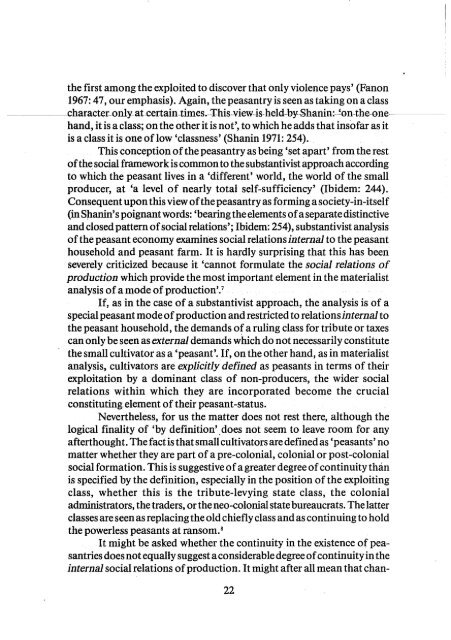You also want an ePaper? Increase the reach of your titles
YUMPU automatically turns print PDFs into web optimized ePapers that Google loves.
the first among the exploited to discover that only violence pays' (Fanon<br />
1967: 47, our emphasis). Again, the peasantry is seen as taking on a class<br />
character-only-atcertain-times.-1'his-view-is held-by £hanin:-~on-the-one<br />
hand, it is a class; on the other it is not', to which he adds that insofar as it<br />
is a class it is one of low 'classness' (Shanin 1971: 254).<br />
This conception of the peasantry as being 'set apart' from the rest<br />
of the social framework is common to the substantivist approach according<br />
to which the peasant lives in a 'different' world, the world of the small<br />
producer, at 'a level of nearly total self-sufficiency' (Ibidem: 244).<br />
Consequent upon this view of the peasantry as forming a society-in-itself<br />
(in Shanin's poignant words: 'bearing the elements of a separate distinctive<br />
and closed pattern of social relations'; Ibidem: 254), substantivist analysis<br />
ofthe peasant economy examines social relations internal to the peasant<br />
household and peasant farm. It is hardly surprising that this has been<br />
severely criticized because it 'cannot formulate the social relations of<br />
production which provide the most important element in the materialist<br />
analysis of a mode of production'. 7<br />
If, as in the case of a substantivist approach, the analysis is of a<br />
special peasant mode of production and restricted to relations internal to<br />
the peasant household, the demands of a ruling class for tribute or taxes<br />
can only be seen as external demands which do not necessarily constitute<br />
the small cultivator as a 'peasant'. If, on the other hand, as in materialist<br />
analysis, cultivators are explicitly defined as peasants in terms of their<br />
exploitation by a dominant class of non-producers, the wider social<br />
relations within which they are incorporated become the crucial<br />
constituting. element of their peasant-status.<br />
Nevertheless, for us the matter does not rest there, although the<br />
logical finality of 'by definition' . does not seem to leave room for any<br />
afterthought. The fact is that small cultivators are defined as 'peasants' no<br />
matter whether they are part of a pre-colonial, colonial or post-colonial<br />
social formation. This is suggestive of a greater degree of continuity than<br />
is specified by the definition, especially in the position of the exploiting<br />
class, whether this is the tribute-levying state class, the colonial<br />
administrators, the traders, or the neo-colonial state bureaucrats. The latter<br />
classes are seen as replacing the old chiefly class and as continuing to hold<br />
the powerless peasants at ransom. 8<br />
It might be asked whether the continuity in the existence of peasantries<br />
does not equally suggest a considerable degree of continuity in the<br />
internal social relations of production. It might after all mean that chan-<br />
22
















